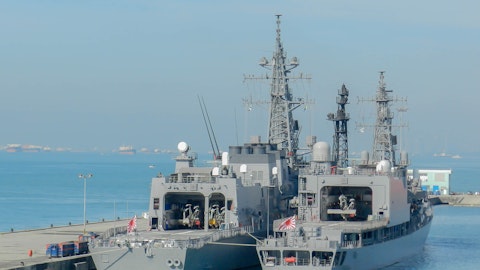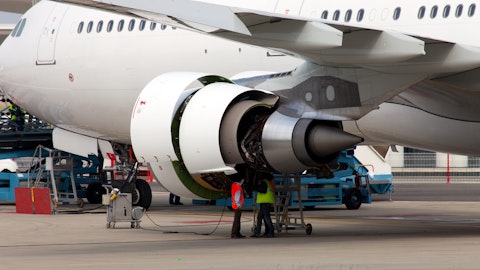Patrick Shanahan: Sure. Maybe I’ll just take the diversification one first. To the degree that Spirit has approached that in the past, I would say, no. Diversification doesn’t make sense at this time. And when you look at the demand for commercial airplanes, having two of the biggest customers in the world and not being able to satisfy the demand, it should command our full attention. On maybe the kind of the next level down, we’ve built a great defense business here, and it’s a more dangerous world, and I think what you would take away from some of that is we have tremendous engineering capability. And when you think about the future of large-scale aerostructures, it’s advanced materials. So to that extent, the diversification and probably developing broader capability in advanced materials makes a lot of sense.
Aftermarket is — just isn’t of the volume that we see in the other businesses. And to your earlier question, I believe they’re conforming, we’ll make sure to get back to you on our full answer there.
Mark Suchinski: Yes, Myles. The product that we’re shipping to Boeing at this point in time is being reworked and is conforming. We’ve put the fixes in place. So we’re in good shape there.
Operator: Our next question comes from Scott Deuschle from Deutsche Bank. Please go ahead.
Scott Deuschle: Hey, good morning. Pat, my understanding is that supplier price negotiations with Airbus these days often involve around moving money from one year to another, but that they often fail to address the underlying long-term unit economics for suppliers. But it seems like you need a real structural fix here rather than a band-aid. So I’m curious if you think it’s possible that you get a structural remedy from Airbus. And if not, maybe you can describe what your alternatives might be.
Patrick Shanahan: Well, I won’t describe what the alternatives are because I think we can get a remedy. And I am spending more and more time with my Airbus counterparts. And this is an item of utmost urgency for me personally, and I will be, if not leading, very deep into these conversations and discussions. If you would indulge me for a minute, just kind of talking about composites and advanced materials, just as I mentioned before, really is the future. And when we think about the situation, we have a near-term financial problem. And when I look at the A220 or the C Series, it was produced about the same time as the 787 and the A350. From a technical standpoint, those products are performing extremely well. The maturity of the production system when those designs were certified were really immature, and there are inherent cost limitations.
And the performance that we should be realizing out of the manufacturing system just isn’t there, but I think it’s inherently not there. And between us and Airbus, we have to come to some resolution to address that discontinuity. I think we’ll be able to get to the place that makes sense for both parties. But it is a near-term action that I’m committed to undertaking, and my counterparts at Airbus feel the same sense of urgency.
Operator: Our next question is from Doug Harned from Bernstein. Please go ahead.
Douglas Harned: Good morning. Thank you. When you look at — Spirit has been dealing with new quality escapes over the last year that have resulted from manufacturing problems that happened well before this year, such as the tail fittings, the aft bulkhead issue, 787 nonconformities. How do you make sure that there are not more issues like these still to come out? And how are you thinking about changing the way you approach quality from an operational standpoint so you can prevent this in the future?
Patrick Shanahan: Well, Doug, that’s probably reading my mind in terms of what’s really going to change the reputation and give customers greater confidence is that we really deliver pristine quality products to our customers. Maybe just let me frame it from this standpoint. The tone from the top internally is that my priority is the safety of our teammates, the quality of the product that we build and productivity. Externally, the focus is quality to our customer and on-time, reliable delivery. The mindset I have is that we can be zero defects. I mean, we can eliminate all defects. We have a very robust quality management system. But every day, we have to put time and attention to that. And it isn’t as though there’s a silver bullet out there or a different procedure that we can implement.
It’s the whole organization being first and foremost, focused on how we build the product. And I think you’ll see that over time because that’s where my time will be in, is where you put your time. It gets people’s attention, and leadership has a long shadow. And I think you’ll see us improve quite a bit in this area.
Operator: Our next question comes from David Strauss from Barclays. Please go ahead.
David Strauss: Thanks. Good morning. Mark, I think before you guys had talked about getting to free cash flow positive in 2024. Is there anything on the other side of the Boeing MOA as to why that still wouldn’t be the case? That’s my first question. And second question, just an update. You mentioned the urgency around the refinancing. What are you looking at in terms of timing to come to market? I think previously, you talked about maybe doing it in two phases, so any update there?
Mark Suchinski: Well, good morning David, good to hear from you. As it relates to 2024, I think Pat said, he’s 30 days into his role here. He’s making his way through. We’re looking at the business holistically and really focused on completing the year, getting the business stabilized and then providing you guys a good, robust update in February. But I’ll just kind of reiterate what we said previously. We expect 2024 to be a positive cash flow year. The Boeing MOA is definitely a benefit to 2024 and beyond. And so I’ll leave it at that at this point in time. And in February, we’ll come back and give you more specifics around our plans. As it relates to the refinancing, it’s obviously a big priority for me. The refinancing is a little more than a year out.



